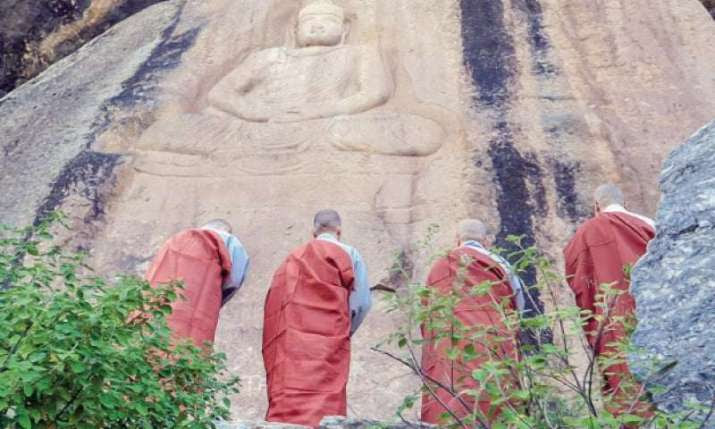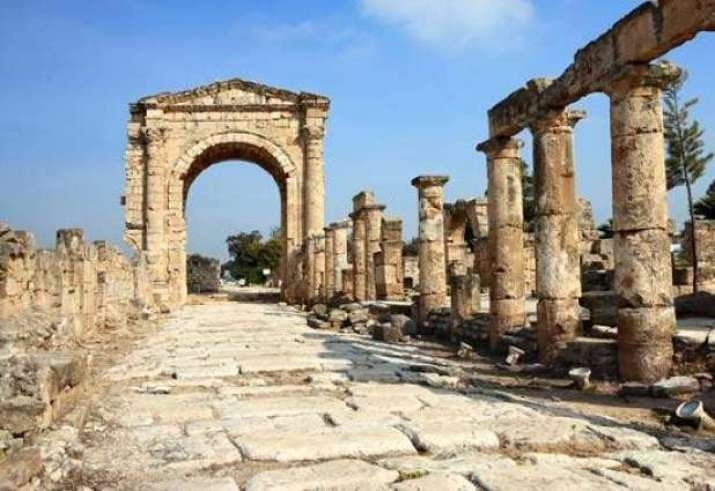
By Shyamal Sinha

Pakistan is home to many significant archaeological sites, harbouring artifacts from some of the world’s earliest civilizations. Several of these important sites, however, have fallen victim to corruption, vandalism, and neglect in recent years, posing a very real threat to the most storied aspects of the country’s cultural heritage.
A high-level delegation of Buddhist monks, pilgrims, and researchers from South Korea arrived in Paksitan on Sunday to undertake a four-day tour of ancient Gandharan archaeological sites. The visit was aimed at strengthening cultural ties between Korea and Pakistan, based on a shared Buddhist heritage and history.
The group included four monks, researchers and professors from Dongguk University, a Buddhist university in Seoul, several Korean businesspeople based in Islamabad, and a number of diplomats, including Kwak Sung-kyu, the South Korean ambassador to Pakistan. The representatives visited various historic sites in Pakistan’s Khyber Province and Taxila region.
In a speech to mark the occasion during a visit to Peshawar Museum, the Korean ambassador emphasized the importance of bilateral cooperation to promote cultural ties between the two countries, emphasizing the unique world heritage of the Gandharan civilization as a major impetus for planned growth in Buddhist pilgrimage and tourism to Pakistan.
The ancient civilization of Gandhara flourished in the Peshawar basin in present-day northwest Pakistan and northeast Afghanistan, centered at the confluence of the Kabul and Swat rivers. Lasting from around sixth century BCE to the 11th century CE, and peaking from about 100 BCE to 200 CE, the kingdom was a major center for Greco-Buddhism under the Indo-Greeks, Gandharan Buddhism under later dynasties, and served as a locus for the spread of Buddhism to central and East Asia.
“We need to promote religious tourism as [Khyber Pakhtunkhwa Province] has 6,000 archaeological and Buddhism sites,” said Khyber Pakhtunkhwa Minister for Tourism Atif Khan. He noted that Khyber Pakhtunkhwa was a popular pilgrimage destination among Koreans as Buddhism was introduced to the ancient Kingdom of Baekje in 384 CE by the Gandharan monk Maranatha. (The News International)
As such, Korean Buddhism can be directly traced back to the Gandharan civilization, Khan said, adding that many Buddhist holy sites, monasteries, and archaeological sites were located in Pakistan, and particularly in Khyber Pakhtunkhwa. He said the government was spending 600 million rupees (US$3.8 million) to maintain these sites and was seeking further funding to maintain and improve more archaeological sites in the province.
On Wednesday, after touring sites including Butkara-I, the Saidu Sharif stupa, the Jahanabad Buddha in Manglawar, and Swat Museum, members of the Korean delegation expressed their appreciation for the Buddhist heritage sites to media representatives, saying that Swat was rich in ancient Buddhist heritage and of significance for Buddhists all over the world.
The Korean ambassador observed that Swat was a sacred place for Korean Buddhists, with a long bond stretching back to 723 CE, when the Korean monk Hyecho visited Gandhara and ancient Uddiyana, present-day Swat. “Swat valley is not only rich in Buddhist ancient sites but it is also very beautiful and scenic where people are hospitable,” Kwak added. (Dawn)
Park Joung-koo, dean of international affairs at Dongguk University, expressed excitement at visiting Buddhist sites in the Swat Valley, exclaiming that Swat was beautiful beyond his imagination. “Swat valley is home to the ancient Indian and Gandhara civilizations. Many Korean pilgrims, monks, and other people love to visit it,” he said. “I am excited that I am part of the delegation that for the first time visited this beautiful valley and saw some of the most beautiful ancient Buddhist sites.” (Dawn)

Dr. Abdul Samad, director of archaeology and museums, said Pakistan’s government had loaned 42 artifacts from Peshawar Museum for an exhibition in South Korea aimed at raising awareness among Koreans about the 1,600-year-old cultural and spiritual ties between the two countries.
“The arrival of delegation including monks was the outcome of that exhibition and now we are expecting more tourists interested in heritage, history, and archaeology,” Samad said. “Many Pakistanis and many Koreans do not know that a monk from Swabi went to Korea and spread Buddhism there. For past 20 years in post-9/11 era, tourists had stopped coming and many people lost touch with such interesting facts, but we are trying to revive cultural and historic links to promote and boost heritage tourism.” (Dawn)
In November, Pakistan expects to welcome a delegation of monks from the Jogye Order of Korean Buddhism, South Korea’s largest Buddhist order.
Data for 2010 from the Washington, DC-based Pew Research Center indicates that 96.4 per cent of Pakistan’s population identify as Muslim. According to Pakistan’s National Database and Registration Authority, an independent government agency, there were just 1,492 registered Buddhists in Pakistan as of 2012.
source – Buddhistdoor











